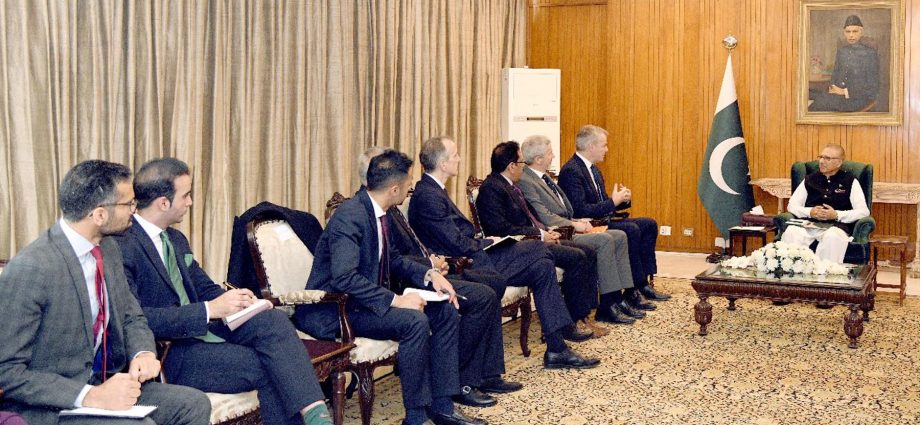President Alvi for ethical use of artificial intelligence, online & open sharing of educational resources
Says Pakistan was facing many challenges on the financial, economic & political front
ISLAMABAD ( Web News )
President Dr. Arif Alvi has called for the ethical use of artificial intelligence (AI), ensuring the safety and security of data, and online and open sharing of knowledge and expertise by renowned universities with Pakistani Higher Education Institutions (HEIs) to help improve the capacity and capabilities of Pakistani students as per world standards.
President Dr. Arif Alvi expressed these views while talking to a delegation of the Oxford Pakistan Programme from the University of Oxford, that called on him, at Aiwan-e-Sadr on Monday. Talking to the delegation, the President said that the exposure of Pakistani students at international institutions, such as Oxford, would help them refine and finetune their ideas, besides helping them achieve their learning goals. He added that it would also help them in finding solutions to problems faced by their country and the world, including global warming, climate change, energy and food shortages, hunger and misery, avoiding war and pursuing total peace in the region and the world.
President Dr. Arif Alvi said that developing strong, durable and meaningful linkages between the University of Oxford and Pakistani HEIs by pursuing exchanges of faculty and students, online sharing of lectures and learning modules, research development, giving access to Pakistani students to the Oxford online knowledge and learning repository would help in bringing the standard of Pakistan students at par with their counterparts in the rest of the world. The President stated that the Higher Education Commission (HEC) had announced its online education policy, which had provided the framework for HEIs to set up their own IT systems and online & hybrid system of learning to enhance their enrolment and grant access to additional students into their system. The President said that the universities in Pakistan were unable to meet the growing demand for students, therefore, they must set in place out-of-the-box solutions to increase enrolment without compromising the quality and effectiveness of the education system.
President Dr. Arif Alvi said that Pakistan was facing many challenges on the financial, economic and political front, therefore, our students should be given an international perspective to find solutions to issues through capacity building and undertaking result-oriented research and development processes. He said that the universities play a crucial role towards human resource development, which ultimately contributes towards the socio-economic progress of the country. He expressed the need for creating linkages between academic research and the public policy formulation process by developing and strengthening international collaborations between Pakistani universities and reputed foreign universities. He said that such collaboration may include faculty and students exchange, sharing of information and experiences about each other’s academic policies and initiatives, organization of seminars and conferences and planning short-term training modules for capacity building of staff and reciprocal visits of officials.
President Dr. Arif Alvi appreciated the Oxford Pakistan Program (OPP) to generate momentum on various Pakistan-related activities at the University of Oxford. He said that the program launched by OPP would help in increasing the representation of Pakistani and British Pakistani students at the University of Oxford. During the meeting, it was informed that OPP was providing scholarships and research grants and that the launch of the Pakistani fellow program would help increase the representation of Pakistan at the University of Oxford. It was also informed that OPP would explore ways and means to award scholarships on a preference basis to the students of economically disadvantaged students belonging to Sindh, Balochistan, Khyber Pakhtunkhwa, Gilgit-Baltistan, Azad Jammu and Kashmir and Punjab ensuring gender balance, diversity and inclusivity.

